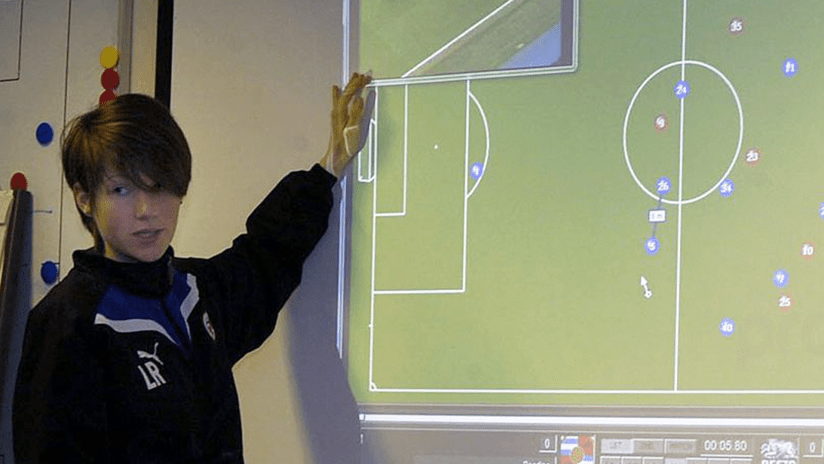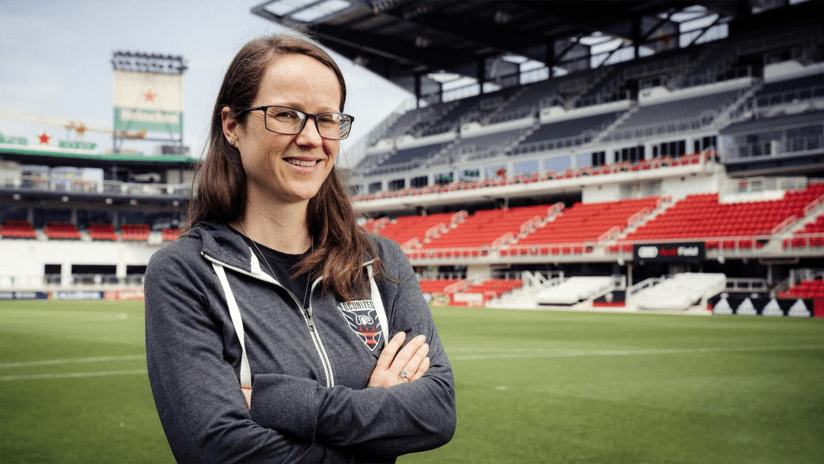As a data and performance analyst with 15 years of experience across MLS and the top two divisions of English soccer, Lucy Rushton knows what it’s like to be the bearer of bad news.
More than once, the woman who is now D.C. United’s general manager and head of technical recruitment & analysis has seen a meticulously crafted report thrown back in her face by a frustrated coach who can’t bear its contents.
Literally.
“I think every analyst probably has had, at some point, something pushed heavily at them or thrown across the room,” Rushton told MLSsoccer.com with a laugh this week. “It’s part and parcel of the job when you have to deliver bad messages or bad information at a time when we're all under stress, because we might have just lost three games on the bounce. So, oh yeah. It happens. It’s real.”
Not everyone in the sport’s upper echelons is happy about the steady rise of analytics and its devotees to positions of power and influence – just check out the ongoing trend of public rants by data skeptics.
As a woman in a traditionally male-dominated field like men’s professional soccer, however, Rushton is optimistic about the future. And her interactions with workplace sexism have been relatively rare – partly because of the objective, reality-based nature of her specialty.
“Data, really, for me when I was starting out, was an avenue where it kind of took gender out of it, because you're presenting facts,” she explained. “It's not necessarily about the subjective opinion. And to be fair, my role grew into that because once you gain the trust and respect of people, then they welcome that subjective more. But at the very start, you're talking about objective facts. So gender or race or ethnicity doesn't just come into it, because you're literally presenting data.”

"I can do this"
It’s not that she’s never battled discrimination. She found it challenging at first to break into an industry where connections and personal networks are hugely influential, and learned to pick up on subtle signs when others in the room weren’t taking her seriously.
“Of course, there have probably been a few jobs that I haven't got because of my gender,” she said. “You feel it. You know it when you're in there, and you feel it from whoever's interviewing you and the feedback you get. You just have to know that there's still going to be that ignorance in some people, and you can't then let it cloud you.
"So yes, I've had those experiences. I've not had that many of them, I'll be honest, and that's where for me, it's kind of like I champion more the people that gave me a chance.”
Those include Nick Hammond, the director of football at Reading FC who hired her in 2008, and Steve Coppell, the Royals manager who incorporated her work into the first team’s routines. And Darren Eales, who convinced her to cross the Atlantic in 2016 to help him launch Atlanta United, where she played a key role in identifying the signings who helped Gerardo “Tata” Martino & Co. take MLS by storm.
“Once you’re experienced and you're in it, you use your experience then to sell yourself,” Rushton explained. “But it's getting that first opportunity and getting that experience and needing a director of football or a head coach to take that leap of faith and just not see gender. Because at that stage you are literally going, ‘Look, I have no experience, but I can do this.’ And that for me was the big one.”
"We need to see continued progression"
She’d also rather celebrate the victories than lament the disappointments. And that’s not just a personality trait, but a pragmatic approach to working in sports, where despite significant progress in recent decades, women remain chronically under-represented.
“If we just look at the raw figures now, for where we are today, and we don't have any context of history, then obviously, it's way off. There's a real tilt,” Rushton noted. “There are just not enough women in these positions. When we look at it compared to 10, 15 years ago, then you can see that actually, things are changing, and that's the important thing, right? That there is this continuous change, but it needs to be that. We can't now say okay, well, yeah, there's a couple of women in these positions. So, tick the box, we've done our job. We need to see that continued progression.”
She’s keen to broaden the perception of what’s possible, especially among younger generations of women seeking a path like hers.
“As a society, we're very quick to put in the media the negatives, and the bad experiences that women have, or the lack of this and the lack of that,” said Rushton. “And to young women aspiring to get into these roles, it only dampens their spirit and their confidence that it's an opportunity for them. Whereas if we're actually more pushing the positive examples, and they see those, then it maybe changes their approach and their confidence to apply for these positions.
“Because it's one thing hiring women in these roles, but I wonder actually how many women apply for the roles in the first place? Because do they have the confidence to put their name in the hat? … The more that we can publicize the positives, then it's going to help women and encourage other clubs as well to see it as a way forward.”
Demanding higher standards
Part of her enthusiasm about the sport’s evolution comes from her experiences in MLS, where she sees rising generations of players and coaches who have been immersed in data-driven cultures amid an overall more open-minded approach to analytics.
“We have a lot of good young coaches over here too,” said Rushton. “The younger the coach, the more open they are to exploring these new innovations and kind of data and science, because it was a part of their playing career or it's been a part of their recent history.
“So now these younger coaches come in with fresh impetus and fresh ideas, and they want that. They have a real drive for getting it. And we see it with players, too – the young players coming through, they've been given so much at academy level or coming into first team, that they’re used to having data, and they’re used to having video. So they're demanding these higher standards from us, which is fantastic for everybody.”
Rushton does reveal one lingering difficulty for women like her, though – in the form of a tongue-in-cheek demand to equipment managers.
“I've got to be honest, the most challenging people to work with have been kit men,” she deadpanned. “I'm like, ‘Look, guys’ clothing doesn't look great on me, is there any women's wear?’ And so you just become a problem to them.”
With women like her climbing the ranks across MLS, kit men will have to adapt, the same as those coaches who have grown to embrace Rushton and other analytics experts like her.










